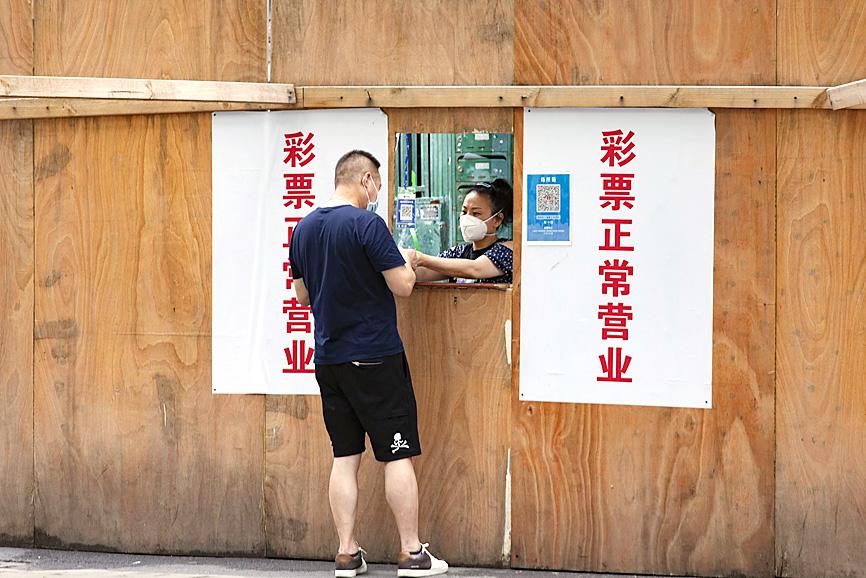China yesterday reported almost 700 new COVID-19 cases, with more infectious variants of SARS-CoV-2 continuing to test the nation’s hardline approach as outbreaks spread beyond major cities.
China reported 699 cases — the highest daily tally since May 22 — after recording more than 1,000 infections over the weekend.
Most of the cases are in the Guangxi region in the south, which recorded 243 cases — taking its total since the outbreak there flared six days ago to 829 — and remote Gansu Province, which reported 231 new infections, taking the number of cases there in the past week to 953.

Photo: Bloomberg
Most of Gansu’s capital, Lanzhou, has been locked down for almost a week and a lockdown was imposed in at least two districts of Beihai, a seaside city in Guangxi, trapping more than 2,000 tourists.
Many of them are stranded on the popular tourist island of Weizhou, after authorities on Sunday banned anyone from going to or leaving the island, Hongxing News reported.
A woman who was vacationing in Weizhou said she boarded a ferry on Sunday to leave the island, but it cruised at sea for two hours before turning back after authorities refused to allow tourists to land in Beihai.
She is back on Weizhou, but worries about getting food and other essential items because the island is locked down and most businesses are closed, Hongxing News reported yesterday.
While Shanghai’s situation is less dire, officials in the city, which endured a bruising two-month lockdown during April and May, are taking no chances and rolling out a testing blitz in 13 of the city’s 16 districts that are home to about 22 million people.
The financial hub reported 23 cases. Daily cases in the city have dropped from highs reached earlier this month, but they have held in double-digits for two weeks and high-risk areas continue to be locked down.
Chengdu, the capital of Sichuan Province, shut entertainment venues for seven days to control an outbreak that has grown to 35 cases since Friday.
Residents endured rain and wind at neighborhood testing stations on Friday and posted videos about the experience on social media.
Meanwhile, authorities in Guangzhou have apologized for breaking into the homes of people who had been taken to a quarantine hotel in the latest example of heavy-handed disease prevention measures.
State media said that 84 homes in an apartment complex in Guangzhou’s Liwan District had been opened in an effort to find any “close contacts” hiding inside and to disinfect the premises.
The doors were later sealed and new locks installed, the Global Times reported.
The Liwan District Government on Monday apologized for such “oversimplified and violent” behavior, the paper said.
An investigation has been launched and “relevant people” would be severely punished, it said.
China’s adherence to a “zero COVID-19” strategy, which requires mass testing, snap lockdowns and travel restrictions, has exacted a heavy economic and social toll.
Chinese President Xi Jinping (習近平) has made zero tolerance for COVID-19 a hallmark of his rule, saying the nation will not pursue “herd immunity” because it would exact too much of a toll, particularly on China’s elderly, who have lower vaccination rates.
Additional reporting by AP

SECURITY: As China is ‘reshaping’ Hong Kong’s population, Taiwan must raise the eligibility threshold for applications from Hong Kongers, Chiu Chui-cheng said When Hong Kong and Macau citizens apply for residency in Taiwan, it would be under a new category that includes a “national security observation period,” Mainland Affairs Council (MAC) Minister Chiu Chui-cheng (邱垂正) said yesterday. President William Lai (賴清德) on March 13 announced 17 strategies to counter China’s aggression toward Taiwan, including incorporating national security considerations into the review process for residency applications from Hong Kong and Macau citizens. The situation in Hong Kong is constantly changing, Chiu said to media yesterday on the sidelines of the Taipei Technology Run hosted by the Taipei Neihu Technology Park Development Association. With

CARROT AND STICK: While unrelenting in its military threats, China attracted nearly 40,000 Taiwanese to over 400 business events last year Nearly 40,000 Taiwanese last year joined industry events in China, such as conferences and trade fairs, supported by the Chinese government, a study showed yesterday, as Beijing ramps up a charm offensive toward Taipei alongside military pressure. China has long taken a carrot-and-stick approach to Taiwan, threatening it with the prospect of military action while reaching out to those it believes are amenable to Beijing’s point of view. Taiwanese security officials are wary of what they see as Beijing’s influence campaigns to sway public opinion after Taipei and Beijing gradually resumed travel links halted by the COVID-19 pandemic, but the scale of

A US Marine Corps regiment equipped with Naval Strike Missiles (NSM) is set to participate in the upcoming Balikatan 25 exercise in the Luzon Strait, marking the system’s first-ever deployment in the Philippines. US and Philippine officials have separately confirmed that the Navy Marine Expeditionary Ship Interdiction System (NMESIS) — the mobile launch platform for the Naval Strike Missile — would take part in the joint exercise. The missiles are being deployed to “a strategic first island chain chokepoint” in the waters between Taiwan proper and the Philippines, US-based Naval News reported. “The Luzon Strait and Bashi Channel represent a critical access

Pope Francis is be laid to rest on Saturday after lying in state for three days in St Peter’s Basilica, where the faithful are expected to flock to pay their respects to history’s first Latin American pontiff. The cardinals met yesterday in the Vatican’s synod hall to chart the next steps before a conclave begins to choose Francis’ successor, as condolences poured in from around the world. According to current norms, the conclave must begin between May 5 and 10. The cardinals set the funeral for Saturday at 10am in St Peter’s Square, to be celebrated by the dean of the College